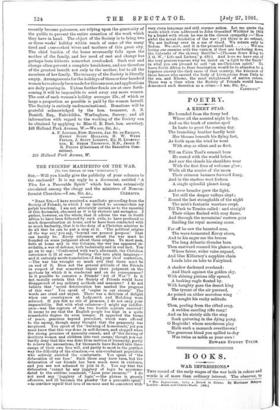"Dean SIR,—I have received a manifesto prcceeding from the Society
of Friends, to which I am invited to accommodate my pulpit teaching. I am not absolutely certain as to the meaning of this document, obscured as it is by rhetoric and metaphor. I gather, however, on the whole, that it affirms the war is South Africa to have been followed by such evils, to have produced so much demoralisation at home, and to have been conducted with so much barbarity, that it is the duty of a Christian minister to do all that he can to put a stop to it. ' The political origins of the war are,' you say, • beyond our present purpose.' That can hardly be. Every utterance about the war must be founded on some judgment about these origins. To most men, both at home and in the Colonies, the war has appeared in- evitable, a war of defence, both technically and in real fact. You go on to say : • Confronted with war's aftermath, the Christian conscience is ill at ease.' Putting this into plain language— and it certainly needs translation—I find your chief contention, —The war has wrought so much evil that there must he an end of it. Does not the general attitude of the Friends in respect of war somewhat impair their judgment on the methods by which it is conducted and on its consequences? Is it possible to conceive a Friends' Art of War' ? Is it not morally certain that the Society of Friends would have disapproved of any military methods and measures ? I do not believe that ' moral deterioration has marked the progress of this war.' You speak of ' orgies in our streets.' The words are cruel and unjust. There was a delirium of delight when our countrymen at Ladysmith and Mafeking were relieved. If you felt no stir of pleasure, I do not envy your impassibility. But with what calmness—I might say indiffer- ence—was the capture of the two hostile capitals received ! It seems to me that the English people has kept in a quite remarkable degree its even temper. It approved the terms of peace, generous beyond precedent, which were offered to the enemy, though many thought that the generosity was misplaced. You speak of the , burning of homesteads,' yet you must know that this was done in self-defence, and stopped when the strong pressure of necessity ceased; and of 'the driving of destitute women and children into vast camps,' though you can hardly deny that this was done from motives of humanity, partly to relieve the necessitous, for thousands have flocked into these camps of their own free will, and partly to meet in the gentlest way the difficulty of the situation.—a non-combatant population who actively assisted the combatants. You speak of ` the defamation of our foes.' Such there may have been, but the defamation of our friends has been much more in evidence, and you are not ashamed to join in it. You say that the defamation 'cannot by any jugglery of logic be accommo- dated to the sublime command, " Love your enemies."' I do not need any jugglery of logic' logic'—the phrase is grossly offensive, and ill becomes the pleader • for a peaceable spirit' —to convince myself that love of enemies may be consistent with very stern language and still sterner action. Let me quote the words which were addressed to John Greenleaf Whittier in 1863 by a friend with whom he was in the closest sympathy How awful the moral desolation of the war ! yet there is no retreat. We are half way over in a sea of blood. We return only to Sodom. We crow., and it is the promised land. . . . . . We are loving our enemies with the cannon if they are battering down the bulwarks of the slavery Bastille.'—(Thomas Starr King to J. G. W., `Life and Letters,' p. 439.) And here we have one of the very gravest reasons why we insist on ' a fight to the finish' in what you are pleased to call 'an un-Christian spirit.' To leave South Africa to Boer domination would be to abandon to a hopeless slavery the dark races of that country, the kinsmen of those heroes who carried the body of Livingstone from Dale to the sea, and Kama, the most enlightened of native rulers. There was a time when the Society of Friends would have denounced such desertion as a crime.—I am, Sir, etc.,
CLERICUS."


































 Previous page
Previous page